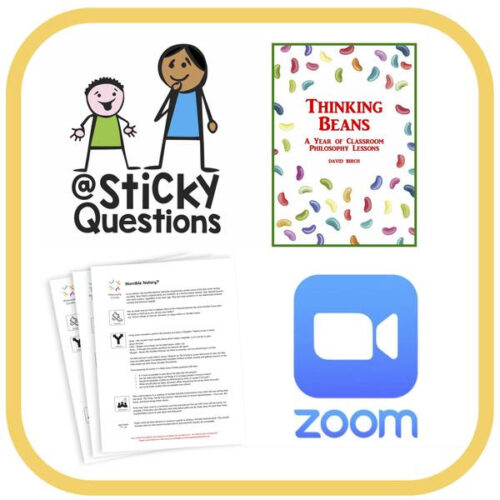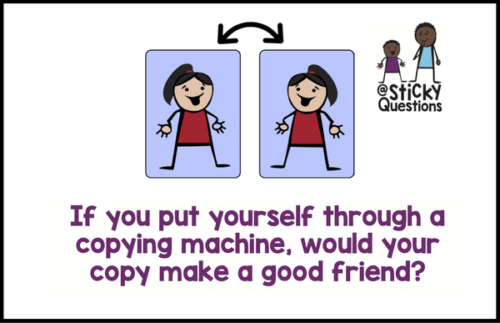One of the questions we hear most often from all teachers, but especially those of younger children, is, “How can I get round them all saying the same thing?” So, this week, seven Parrot Preventers to help children come up with their own reasons, rather than repeating what’s already been said. First, details of our Summer Term Taster, a great way to give P4C a boost before the holidays.

Summer Term Taster!
Do you want to use the freedoms of Summer Term to try more P4C? Then this offer might be for you.
In our Summer Term Taster, you get:
- A term’s worth of our briiliant home-school resource, Sticky Questions, for R-Yr6 (age 4-11) (enough for 210 children for 13 weeks – see here to learn more about Sticky Questions.
- A copy of David Birch’s Thinking Beans: A Year of Classroom Philosophy Sessions
- The brand new Philosophers’ Kitchen – our six favourite easy-win activities with at least six examples for different ages, over 40 sessions in all!
- Access to a live, online Zoom training session that your whole staff can attend (or to an on-demand alternative that you can view at your leisure).
The cost of the whole package is just £99+VAT and you can choose when we invoice you – either before or after the new financial year. It’s available to all schools worldwide – southern hemisphere schools, just replace summer with winter in your head!
Parrot Preventers: How to Stop Students Repeating Each Other
1. Simultaneous snap decisions. Get them to make quick, simple decisions of their own that don’t involve consulting others or having the time to look around to see what a friend thinks. Ideally, these should be a matter of preference rather than needing much thought. “Hands on your head for bananas, arms folded for apples.” This will help them feel capable of making their own choices, and being less reliant on others. For more thoughtful questions, use yes/no, or agree/disagree cards that everyone can hold up at once.

2. Scaffolding. Once you’ve got your main question, think about the different responses that could be given. Then, rather than just asking the main question, a different sentence starter to each child you call on so they each approach it in different way. For example:
What’s more important, friends or toys?
…Max, what’s good about having lots of friends?
…Casey, what can friends do that toys can’t?
…Parin, is it possible to fall out with toys?
…Tia, what might someone with no friends say about this?
3. Practise thinking differently. Borrow this game from Improv: Give the group a category of things and challenge them to name as many different items as they can. The one rule is they can’t repeat something already said. For example: “name me…things you’d find in a bathroom.”
Add extra challenge by adding a time limit for each answer (for older children this can be a matter of seconds). You can also put one person on the spot and get them to name 8 things as quickly as possible, with celebration by all if achieved!
4. Model disagreement between you and a colleague. This can be as simple as taking opposing sides on a question and drawing attention to not only the fact you disagree, but that you’re trying to gcome up with lots of different reasons.
“I disagree with you Miss Trench, and here’s one reason…
(visibly thinking)…and I think I have another different reason, that is..
(Pausing for morethought) …and finally, a third reason is…”

5. Use detailed, visible stimuli that invite reasons based on what they can see / read. Sometimes, a lack of original reasons comes from too much pressure on the imagination. For example, show a picture of a blobfish and ask “Can anything be beautiful?”
Encourage them to say what they see when giving their reasons.
“No, because it’s eyes are really big!”
“No, because it’s skin looks slimey!”
“Yes, because another blobfish might find this one quite handsome!”
Objects or stories rich in detail also work well.
6. Don’t be afraid to be firm! The welcoming, inclusive nature of P4C can leave us feeling reticent to be demanding, or even reprimanding. However, if a child is capable of new ideas but still chooses to repeat what they’ve already heard, try a sharp “we’ve had that already, we’re asking for new thoughts” to make it clear you’re not in the mood for lazy thinking and time-wasting. All contributions might be welcome, but not multiple times!
7. Mind your (body) language. Last month I asked some young children which they preferred – apples or oranges? Despite my best efforts, we couldn’t break a streak of “oranges, because they’re juicy” from almost every child. Afterwards the teacher said “I noticed after the first child’s response, you raised your eyebrows and smiled. They all thought ‘ah, he likes that!’ And from then on, they all wanted to get the same reaction!” Small mannerisms can make a big difference. Experiment with keeping a neutral expression between contributions.
Best wishes,
Tom and Jason

Never miss a resource! Get these P4C ideas sent straight to your inbox every week for free.